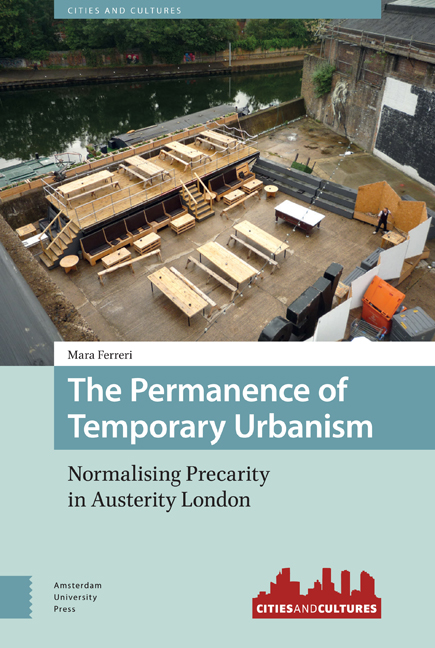1 - Temporary Urbanism: A Situated Approach
Published online by Cambridge University Press: 13 April 2021
Summary
Abstract
Over the past decade, temporary urbanism has emerged as an imaginary and a practice. This chapter introduces the importance of a critical and grounded approach to the phenomenon and outlines the key themes discussed in the monograph. It argues that the roots of temporary urbanism lie in established Western cultural tropes depicting vacancy and temporariness as urban social and spatial alterity. Linking its establishment to dynamics of austerity policymaking and urban restructuring, it contends that temporary urbanism has become a key imaginary in a recurrent urban crisis landscape geared towards greater life and place insecurity. The need for a situated and longitudinal approach undergirds the rationale behind a semi-ethnographic focus on the glamorisation of austerity culture in post-2008 London.
Keywords: situated research, temporary urbanism, precarity, austerity, London
The rise of temporary urban projects in cities over the past decade is a welldocumented phenomenon and has increasingly gained visibility in the public discourse and in urban policy circles. Commentators in architecture, urban policy and the arts have used terms such as ‘pop-up’, ‘temporary’, ‘interim’ and ‘meanwhile’ to capture innovative forms of short-term use of urban spaces. From theatres to community spaces and homes, temporary urban practices have opened the temporary form to the operations of a variety of urban actors, from public institutions to private and third-sector organisations. New and established urban practitioners contributed to the emergence of small-scale projects such as short-term retail outlets, ephemeral art galleries and temporary community gardens, which have rapidly informed, as practices and policies, a ‘new vernacular’ of urban cultures in Europe and North America. Ideas of a ‘pop-up’ or ‘temporary’ city of voluntary small-scale projects such as community gardens and ephemeral cultural centres have rapidly become commonplace in London and other large Western cities and have been encouraged through cultural and urban policy.
In the UK, the polyvalence of signification that characterises the discourse of temporary urbanism is well represented by two quotes, which can be taken to exemplify two distinct moments. The first is from the newspaper The Times in an article titled ‘Art's great squatting revolution’, which begins as follows:
There is probably an empty building in your street, you may have walked past it a thousand times and not noticed its slow and mossy decay, or maybe you don't know it's even vacant because, theoretically, it's not: someone has taken it over, fixed it up a bit and is putting it to good use, using it as a theatre, a gallery, a shop, a community space or home. The chances are that they are not even doing it illegally.
- Type
- Chapter
- Information
- The Permanence of Temporary UrbanismNormalising Precarity in Austerity London, pp. 9 - 28Publisher: Amsterdam University PressPrint publication year: 2021



